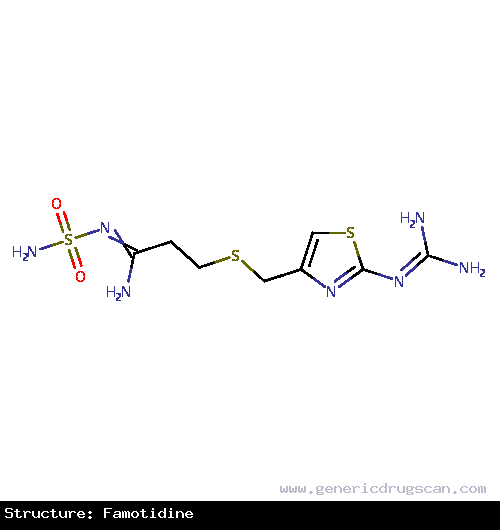Famotidine Drug: Indication, Dosage, Precaution, Side Effect , Storage, Category Type and corresponding Brands - www.genericdrugscan.com
Famotidine
Drug Status in USA : ApprovedDrug Status in Canada : Approved
pronunciation
pronounced as (fa moe' ti deen)
Why is this medication prescribed?
Prescription famotidine is used to treat ulcers (sores on the lining of the stomach or small intestine); gastroesophageal reflux disease (GERD, a condition in which backward flow of acid from the stomach causes heartburn and injury of the esophagus
- tube that connects the mouth and stomach
How should this medicine be used?
Prescription famotidine comes as a tablet and a suspension (liquid) to take by mouth. It is usually taken once daily at bedtime or two to four times a day. Over-the-counter famotidine comes as a tablet, a chewable tablet, and a capsule to take by mouth. It is usually taken once or twice a day. To prevent symptoms, it is taken 15 to 60 minutes before eating foods or drinking drinks that may cause heartburn. Follow the directions on your prescription or the package label carefully, and ask your doctor or pharmacist to explain any part you do not understand. Take famotidine exactly as directed. Do not take more or less of it or take it more often or for a longer time than prescribed by your doctor.
Shake the liquid well for 5 to 10 seconds before each use to mix the medicine evenly.
Swallow the tablets and capsules with a full glass of water.
Thoroughly chew the chewable tablets before swallowing them. Swallow the chewed tablet with a full glass of water.
Do not take more than two tablets, capsules, or chewable tablets of over-the-counter famotidine in 24 hours and do not take over-the-counter famotidine for longer than 2 weeks unless your doctor tells you that you should. If symptoms of heartburn, acid indigestion, or sour stomach last longer than 2 weeks, stop taking over-the-counter famotidine and call your doctor.
What are the precautions to be followed?
Before taking famotidine,- tell your doctor and pharmacist if you are allergic to famotidine, cimetidine (Tagamet), nizatidine (Axid), ranitidine (Zantac), or any other medications.
- tell your doctor and pharmacist what prescription and nonprescription medications, vitamins, nutritional supplements, and herbal products you are taking. Be sure to mention any other medications for heartburn. Do not take over-the-counter famotidine with any other prescription or nonprescription medications for heartburn unless a doctor tells you that you should.
- tell your doctor if you have phenylketonuria (PKU, an inborn disease in which mental retardation develops if a specific diet is not followed), and if you have or have ever had trouble swallowing or kidney disease.
- tell your doctor if you are pregnant, plan to become pregnant, or are breast-feeding. If you become pregnant while taking famotidine, call your doctor.
What are possible side effects of this medication ?
Famotidine may cause side effects. Tell your doctor if any of these symptoms are severe or do not go away:- headache
- dizziness
- constipation
- diarrhea
- fussiness (in babies who take famotidine)
- hives
- skin rash
- itching
- swelling of the face, throat, tongue, lips, eyes, hands, feet, ankles, or lower legs
- hoarseness
- difficulty breathing or swallowing
Famotidine may cause other side effects. Call your doctor if you have any unusual problems while taking this medication.
How to store the medication and dispose it of after its use later?
Keep this medication in the container it came in, tightly closed, and out of reach of children. Store it at room temperature and away from excess heat and moisture (not in the bathroom). Do not allow the liquid to freeze. Throw away any medication that is outdated or no longer needed, and throw away unused famotidine liquid after 30 days. Talk to your pharmacist about the proper disposal of your medication.
Drug Category/Class
- Anti-Ulcer Agents
- Alimentary Tract and Metabolism
- Drugs for Peptic Ulcer and Gastro-Oesophageal Reflux Disease (Gord)
- Drugs for Acid Related Disorders
- H2 Antagonists
- Cytochrome P-450 CYP2C19 Inducers
- H2-receptor antagonists
| Prescribed | For the treatment of peptic ulcer disease (PUD) and gastroesophageal reflux disease (GERD). |
| Weight : | 337.445 |
| Structure | Famotidine |
 | |
| Formula | C8H15N7O2S3 |
Famotidine has 125 Brands listed
Search Generic Drugs alphabetically
